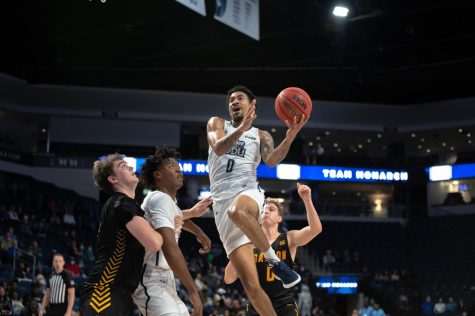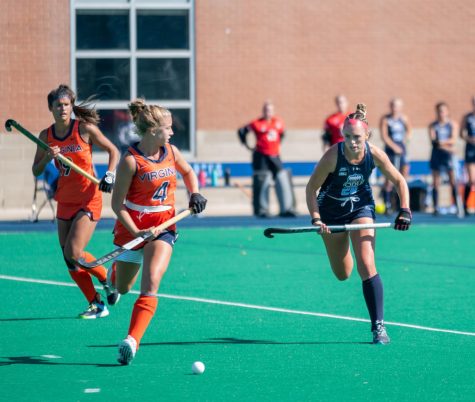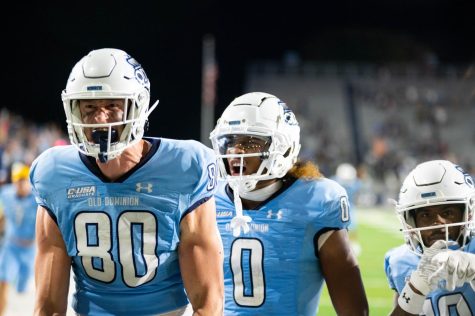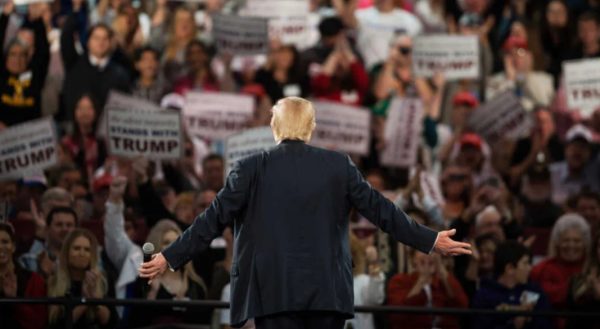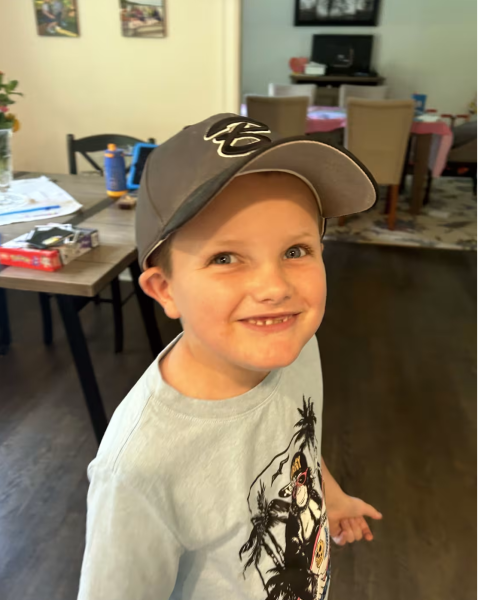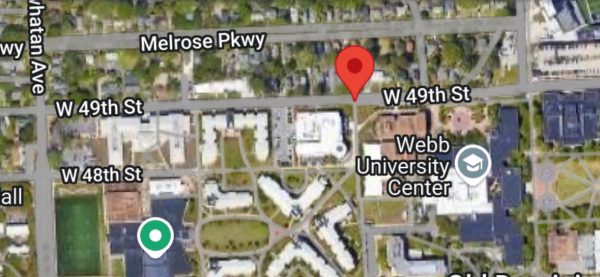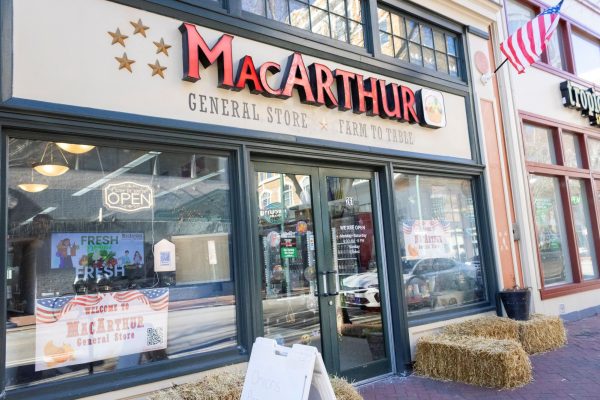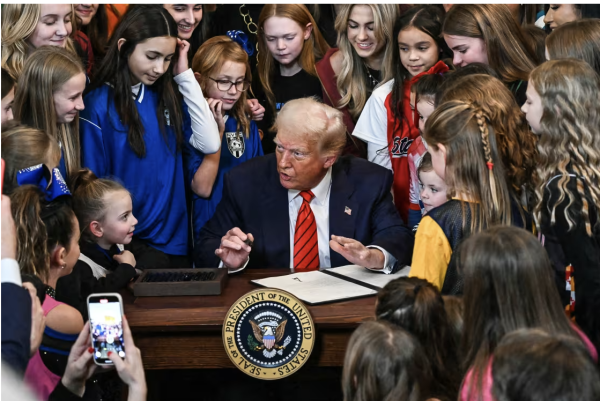President Hemphill: On the ODU Community and Student Leadership, Diversity and Inclusion and What He Foresees for ODU
President Brian O. Hemphill’s presence is often seen as a tall man dressed in a bow-tie suit, greeting students and faculty members at certain events around campus. Oftentimes, he is with his wife and first lady of ODU, Dr. Marisela Rosas. Despite a busy schedule, the president was able to speak with the Mace and Crown about his passion for ODU student life.
His workplace is located on the second floor of Koch Hall. The newly renovated room has a very mid-century modern interior, but what makes this room significant is the great history of important university figures throughout the last century. From President Lewis W. Webb Jr. to the first female ODU President Roseann Runte, these public figures all sat in the same office. They had made some of the most important decisions for the university, including infrastructure plans, increasing student enrollment, and budget spendings or cuts.
The president has had an extensive career in higher education. He served as the associate vice chancellor and dean of students at the University of Arkansas-Fayetteville, served as the vice president for student affairs and enrollment management, and was the associate professor at Northern Illinois University. He also went on to become the tenth president and professor of West Virginia State University. President Hemphill also served as the seventh president and professor of Radford University for five years.
Hemphill has written texts covering topics such as gun violence, financial and economic issues in the collegiate discipline, and studies in STEM.
He was appointed by former President John D. Broderick, after he announced his retirement in 2020.
He was surprised when he discovered that he became ODU’s first African American president.
“It was an honor and a privilege,” Hemphill said. “It’s definitely an honor that I don’t take lightly.”
Being a first-generation college graduate and also accomplishing many ‘firsts’ in his career, engaging with the ODU community is important to him and is proud that ODU is a diverse school. He explained, “We’re an institution where nearly 50% of our students are from diverse backgrounds. About 28% of our faculty are from diverse backgrounds as well, so we’re a very diverse campus.”
“As we’re thinking about our future, we would clearly have a great appreciation for the D.E.I. [Diversity, Equity, and Inclusion],” said Hemphill. “I want to look at how we continue to grow our understanding and our appreciation, [and] prepare our students to be able to leave this institution [to] go out and do great things as strong citizen leaders.”
The president spoke passionately when discussing engagement with the community and addressing the public, a skill in which his masters degree has helped a lot. He graduated from Iowa State University with a masters in journalism and mass communication.
“The skills that I developed and hold as a part of my academic study are of significant benefit, from sitting down and engaging with the media directly to thinking about the public speaking and writing aspects of my work,” President Hemphill explained.
While it’s important for him to engage and interact with students, the president highly encourages students, especially minorities, to lead on-campus organizations, “I say this for minority students and majority students, I think that it’s important for them to engage in leadership opportunities on campus.”
“We have 300+ student organizations to collaboratively engage and work with people from diverse backgrounds and be leaders in these organizations. Be the treasurer, be the president, be the VP — whatever it may be, but engage, that really helps you prepare for the work you do beyond the institution. And so, I think that leadership roles are rounding out — if you will — your educational experience, and I highly encourage students to engage.”
On his advice to students who aspire to be in leadership roles, “you’ve got to make sure that you go and be a part of our organization fair or you have an opportunity to meet the diverse number of organizations that we have. And, just simply figure out what works for you, what will make your college experience even better beyond the classroom.”
“I typically say to students, ‘If you don’t see the organization and we don’t have it, you can develop it.”
While the president has privileges, like any other public servant, the job is far from being facile. Hemphill’s presidential privileges come with a residential home, the Jacobson House, which stands shrouded across from Powhatan Avenue facing the Elizabeth River. He can also carry out executive orders for the university, has a team of staff working in his sector, and meets with other important public servants throughout Virginia.
However, he emphasized that the challenging part of the job is how quickly the hours go by in a day.
“There are so many different people to meet and engage with, but of course, there’s also the challenge of competing events. So, it’s really just managing the time and being able to get to key places and meet members of the community,” Hemphill explained. “I have external and internal groups that I need to make sure I am engaging. And so, it’s just navigating that, that’s the biggest challenge. If we can figure out a way to add more hours in a 24 hour day, that’d be wonderful.”
Despite the challenges and big initiatives, Hemphill always looks forward to the students’ journey during their time at ODU.
“I love the beginning of the year when we have new students that are coming on campus, moving in, meeting the parents, having the conversations with the students, and the excitement and energy at the beginning of the journey,” He said. “But, I equally love the experience of commencement, when you have an opportunity to see so many bright eyes that are excited about the next step in their lives and moving on to great things beyond the institution.”
“Those are two cornerstone experiences that I definitely look forward to because I know the meaning of those experiences and that journey, especially being a first-generation college student myself,” he said. “I know the meaning of what that degree means for families and generations within that same family and so those are things that I always get excited about.”
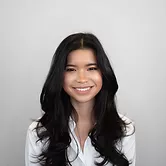
Paula Phounsavath is a senior majoring in English with a concentration in Journalism and a minor in Health and Wellness. She's currently the Editor-in-Chief...


